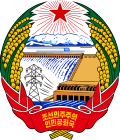
Immigration to North Korea refers to the movement of people into the North Korea (DPRK), a highly secretive and authoritarian state in East Asia. The country maintains strict controls over both emigration and immigration, with the government tightly restricting freedom of movement within its borders and abroad. North Korea rarely allows foreign nationals to immigrate permanently, and most documented cases involve individuals returning to the country after periods abroad, including former defectors who are sometimes encouraged to return through government campaigns offering incentives such as money and housing. [1] [2] The vast majority of North Koreans who leave the country do so as refugees or defectors, often seeking asylum in South Korea or China, rather than as part of regular migration flows. [1] [3]
Contents
North Korea’s immigration policy is shaped by its isolationist stance, economic conditions, and political ideology. The state closely monitors and controls all forms of cross-border movement, and unauthorized travel is punishable by law. [1] The country’s visa policy requires most visitors to obtain advance approval, and tourism for certain nationalities, such as Americans, is currently prohibited. [4] Despite these restrictions, North Korea has occasionally allowed limited numbers of foreign workers, diplomats, and humanitarian personnel to enter, though such access is tightly regulated and subject to political considerations. [1]

